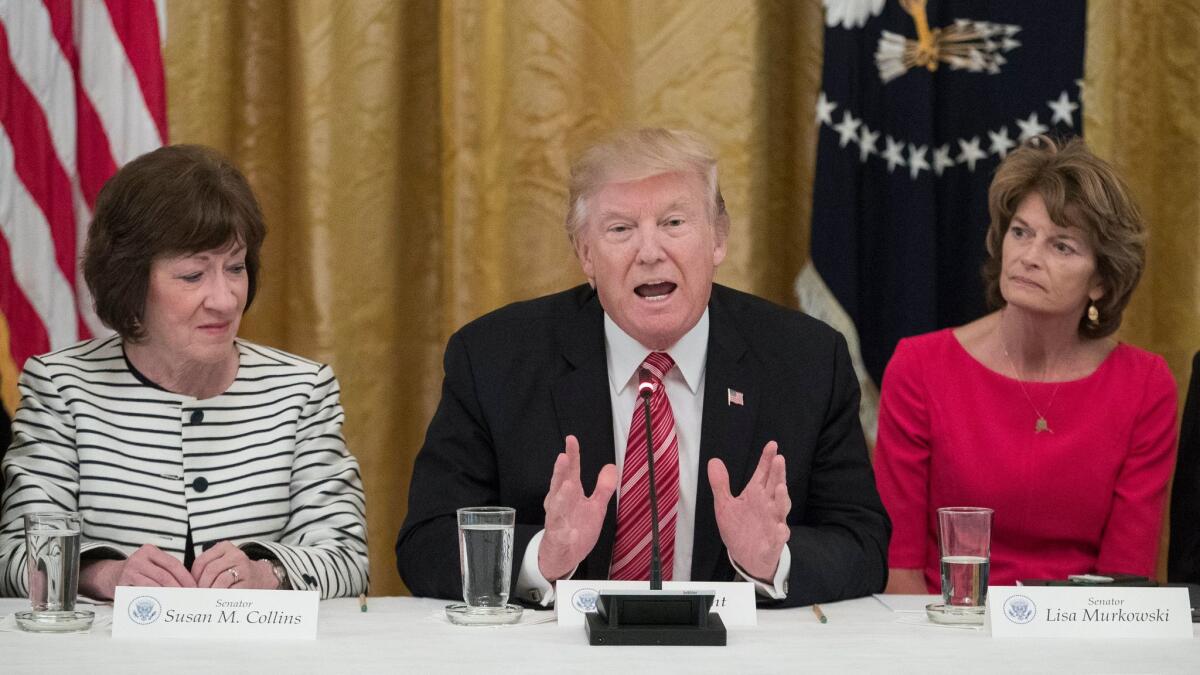Analysis: In a Washington run by men, two overshadowed Republican women make their point on healthcare

- Share via
In a Washington that has grown demonstrably more testosterone-fueled since President Trump’s inauguration, it took two Republican women to secure the end of a long effort to repeal and replace Obamacare.
They were the same two women — Maine Sen. Susan Collins and Alaska Sen. Lisa Murkowski — who had been excluded from the 13-member working group drafting the Republican bills.
“Nobody’s being excluded based upon gender. Everybody’s at the table,” Senate Majority leader Mitch McConnell had said of his all-white-males group.
In the early hours of Friday morning, the duo was overshadowed by the more dramatic and unexpected no vote from Sen. John McCain of Arizona.
There was reason for the attention lavished on McCain — a war hero and veteran senator returns to the Capitol days after a dire cancer diagnosis. But without both Collins’ and Murkowski’s steadfast opposition, his vote would have been meaningless.
Also largely overlooked: Hawaii Sen. Mazie Hirono, a Democrat who voted against the bill. Like McCain, she was recently diagnosed with cancer, in her case late-stage kidney cancer.
Social media buzzed Friday with praise for the women senators from many fronts, including from men. But from many women, there was also a sense of familiarity at being ignored or taken for granted.
To a tweet pointing out the GOP senators’ exclusion at the beginning of the Senate’s healthcare effort and the attention focused elsewhere during the vote, Shawnda Westly, a Democratic strategist from California, joked: “I’m so surprised! Said no women ever reading this tweet.”
“It’s been true throughout history that great men make a difference only due to great women,” added former California congresswoman Ellen Tauscher.
If there was an edge to a desire for recognition, it may have come from the times. A quarter century removed from the “Year of the Woman” — the 1992 election that dramatically increased the numbers of female representatives — politics remains difficult to navigate for women.
They are supposed to be strong but not overbearing; professional, but nurturing. Criticisms they offer tend to be judged more harshly than those coming from men, research shows, so the act of seeking and keeping political office is fraught. Their voices are suspect, and their clothing and hairstyles still analyzed.
The numbers of women in high elective office have stalled in recent years; only 21 members of the Senate are female, five of them Republicans.
Women comprise less than a quarter of elected officials in state legislatures, statewide elective office and in the House and Senate, according to figures compiled by the Center for American Women and Politics at Rutgers University.
In both parties, women have to fight being invisible.
During President Obama’s first term, women on his staff invented a system called “amplification.” If an idea was offered by a woman in a meeting to no notice, another woman would repeat it with credit given to the originator.
The Trump Administration includes some senior women, including the president’s daughter Ivanka, counselor Kellyanne Conway and press secretary Sarah Huckabee Sanders. But the administration’s visage has been mostly male, and its attitudes combative.
Signing ceremonies for important measures — including one on abortion — have included only men. A photo of dozens of Trump advisors gathered for a meeting went viral for including only men.
The president had trouble during the campaign with what his aides euphemistically called “locker room talk.” On Thursday, as the healthcare vote neared, the administration was convulsed by incoming communications director Anthony Scaramucci’s vulgar throwdown against his competitors for White House power, which included a sexual reference to White House advisor Steve Bannon.
Kelly Dittmar, an assistant professor of political science at Rutgers, said that women in Congress interviewed for a recent report showed frustration at being sidelined.
“Perhaps men are taking more credit or being given more credit,” she said. But, she added, most of the women adopted the view that “We’re really not here to claim credit; we’re here to get things done.”
That seemed to be the case with Murkowski and Collins, both of who came under sharp criticism during the healthcare push.
“Neither party has a monopoly on good ideas, and we must work together,” Collins said after the vote, a sentiment Murkowski also put forth.
Neither senator mentioned her own gender during the vote or its aftermath, but others cited them as demonstrating the need for different types of legislators.
“Every woman has had that experience of being shut out of an important discussion, and then being called out for being too aggressive or ambitious when we edge our foot in the door,” Westly said. “What we should be talking about is why women are a crucial perspective to the conversation.”
Those working to persuade more women to run for office have noted a giant upswing in interest since Trump’s election. Most of it, however, has come among Democrats, where women are better represented, if still not anywhere near parity with men.
There was some anticipation, at least, that Collins’ and Murkowski’s role in the healthcare debate would draw notice, particularly among women like them.
“I would hope that it does demonstrate the role that women — and in this case more moderate women — can play in elective office,” said Dittmar. “What we have seen in the last decade or more is a decline in number of moderate Republican women running, and that means that we’re missing that whole contingent.”
For more on politics from Cathleen Decker »
Twitter: @cathleendecker
ALSO:
McCain’s surprise vote doomed healthcare bill, but did it open the door for Senate bipartisanship?
Updates on California politics
More to Read
Get the L.A. Times Politics newsletter
Deeply reported insights into legislation, politics and policy from Sacramento, Washington and beyond. In your inbox three times per week.
You may occasionally receive promotional content from the Los Angeles Times.











